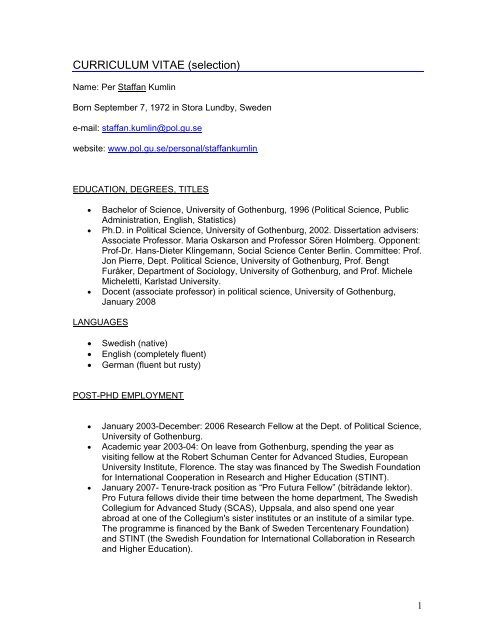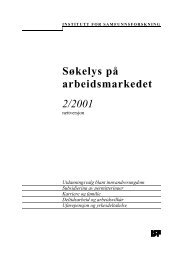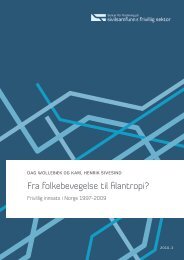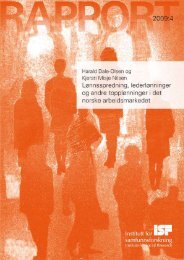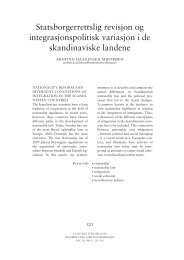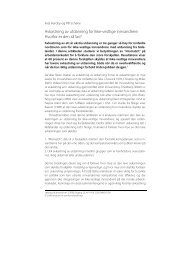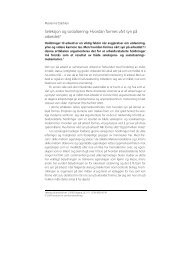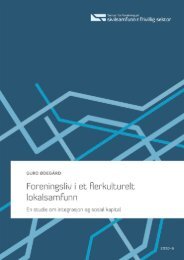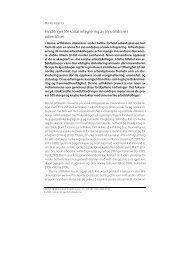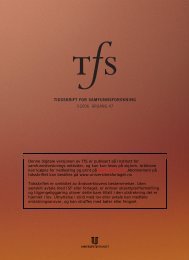CURRICULUM VITAE (selection)
CURRICULUM VITAE (selection)
CURRICULUM VITAE (selection)
You also want an ePaper? Increase the reach of your titles
YUMPU automatically turns print PDFs into web optimized ePapers that Google loves.
<strong>CURRICULUM</strong> <strong>VITAE</strong> (<strong>selection</strong>)<br />
Name: Per Staffan Kumlin<br />
Born September 7, 1972 in Stora Lundby, Sweden<br />
e-mail: staffan.kumlin@pol.gu.se<br />
website: www.pol.gu.se/personal/staffankumlin<br />
EDUCATION, DEGREES, TITLES<br />
• Bachelor of Science, University of Gothenburg, 1996 (Political Science, Public<br />
Administration, English, Statistics)<br />
• Ph.D. in Political Science, University of Gothenburg, 2002. Dissertation advisers:<br />
Associate Professor. Maria Oskarson and Professor Sören Holmberg. Opponent:<br />
Prof-Dr. Hans-Dieter Klingemann, Social Science Center Berlin. Committee: Prof.<br />
Jon Pierre, Dept. Political Science, University of Gothenburg, Prof. Bengt<br />
Furåker, Department of Sociology, University of Gothenburg, and Prof. Michele<br />
Micheletti, Karlstad University.<br />
• Docent (associate professor) in political science, University of Gothenburg,<br />
January 2008<br />
LANGUAGES<br />
• Swedish (native)<br />
• English (completely fluent)<br />
• German (fluent but rusty)<br />
POST-PHD EMPLOYMENT<br />
• January 2003-December: 2006 Research Fellow at the Dept. of Political Science,<br />
University of Gothenburg.<br />
• Academic year 2003-04: On leave from Gothenburg, spending the year as<br />
visiting fellow at the Robert Schuman Center for Advanced Studies, European<br />
University Institute, Florence. The stay was financed by The Swedish Foundation<br />
for International Cooperation in Research and Higher Education (STINT).<br />
• January 2007- Tenure-track position as “Pro Futura Fellow” (biträdande lektor).<br />
Pro Futura fellows divide their time between the home department, The Swedish<br />
Collegium for Advanced Study (SCAS), Uppsala, and also spend one year<br />
abroad at one of the Collegium's sister institutes or an institute of a similar type.<br />
The programme is financed by the Bank of Sweden Tercentenary Foundation)<br />
and STINT (the Swedish Foundation for International Collaboration in Research<br />
and Higher Education).<br />
1
PUBLICATIONS<br />
Peer-reviewed books<br />
- (2004). The Personal and the Political. How Personal Welfare State Experiences Affect<br />
Political Trust and Ideology. New York: Palgrave–Macmillan.<br />
Articles in peer-reviewed journals<br />
- (forthcoming, 2010) “Questioning the New Liberal Dilemma: Immigrants, Social Trust<br />
and the Welfare State.” Comparative Politics (with Bo Rothstein).<br />
- (forthcoming, 2009). “Blaming Europe: Exploring the Variable Link between National<br />
Public Service Dissatisfaction and EU Trust.” Journal of European Social Policy.<br />
- (2006). “Learning from Politics: The Causal Interplay between Government<br />
Performance and Political Ideology.” Journal of Public Policy 26:89-114.<br />
- (2005). ”Making and Breaking Social Capital: The Impact of Welfare State Institutions.”<br />
Comparative Political Studies 38:339 - 365 (with Bo Rothstein).<br />
- (2001) "Ideology-Driven Opinion Formation in Europe: The Case of Attitudes towards<br />
the Third Sector in Sweden." European Journal of Political Research, 39:487-518.<br />
- (1997) "Folket och högervågen. Om opinionsbildning, samhällsstrukturer och ideologisk<br />
förändring i 1980-talets Sverige." Statsvetenskaplig Tidskrift 100:411-440. (“Swedes and<br />
the Ideological Shift to the Right in the1980s”; editorial review only)<br />
Current revise-and-resubmit from peer-reviewed journals<br />
-“Scandal Fatigue: Scandal Elections and Satisfaction with Democracy in Western<br />
Europe 1977-2007.”<br />
-“Informed Electoral Accountability and the Welfare State: Experimental and Real-World<br />
Findings.”<br />
Book chapters in English (*=peer-review of individual chapters)<br />
- (2007). “The Welfare State: Values, Policy Preferences, and Performance Evaluations”<br />
in Oxford Handbook of Political Behavior edited by Russel Dalton and Hans-Dieter<br />
Klingemann. Oxford: Oxford University Press.<br />
2
- (2007). “Social Stratification and Political Articulation: Why Attitudinal Class Differences<br />
Vary Across Countries” in The Welfare State, Legitimacy, and Social Justice edited by<br />
Steffen Mau and Benjamin Veghte. Aldershot: Ashgate. (with Stefan Svallfors).<br />
- (2007).* “Overloaded or Undermined: European Welfare States in the Face of<br />
Performance Dissatisfaction” in The Political Sociology of the Welfare State. Edited by<br />
Stefan Svallfors. Stanford, CA: Stanford University Press.<br />
- (2005). “Value Orientations and Party Choice.” In The European Voter. Edited by<br />
Jaques Thomassen and John Curtice. Oxford: Oxford University Press. (together with<br />
Oddbjørn Knutsen).<br />
- (2002). "Institutions-Experiences-Preferences: Welfare State Design Affects Political<br />
Trust and Ideology". In Restructuring the Welfare State: Political Institutions and Policy<br />
Change. Edited by Rothstein, Bo and Sven Steinmo. New York: Palgrave–MacMillan<br />
Book chapters in Swedish<br />
- (2004) “Välfärdsmissnöje och EU-skepticism.” (Welfare State Dissatisfaction and<br />
Euroscepticism”). In Kampen om euron. Edited by Henrik Oscarsson and Sören<br />
Holmberg. Göteborg: Livréna.<br />
- (2004). “Väljarna, välfärdsstaten och den europeiska integrationen.” (Voters, the<br />
Welfare State, and European Integration.) In EU, skatterna och välfärden. Edited by<br />
Sverker Gustavsson, Lars Oxelheim and Nils Wahl. Stockholm: Santerus.<br />
- (2003). “Politiskt ansvarsutkrävande i Sverige 1986-2002.” (Political Accountability in<br />
Sweden 1986-2002). In Fåfängans marknad. Edited by Sören Holmberg and Lennart<br />
Weibull. Göteborg: The SOM Institute.<br />
- (2003). “Finns det någon ansvarig?” (Anyone responsible?) In Demokratins<br />
mekanismer. Edited by Gilljam, Mikael, and Hermansson, Jörgen. Malmö: Liber.<br />
- (2003). “Snedvridet ansvarsutkrävande?” (A negative bias in political accountability?).<br />
In Demokratitrender. Edited by Henrik Oscarsson. Göteborg: The SOM Institute.<br />
- (2003) "Staten och det sociala kapitalet" (The State and Social Capital) In Välfärdsstat i<br />
otakt. Edited by Jon Pierre and Bo Rothstein. Malmö: Liber förlag. (Together with Bo<br />
Rothstein.)<br />
- (2001) “Missnöje på hemmaplan” (“Dissaffection on home ground”). In Holmberg et al.<br />
EuropaOpinionen. (The Swedish Public and the European Union). Göteborg:<br />
Statsvetenskapliga institutionen.<br />
- (2001) "Demokrati, socialt kapital och förtroende." (Democracy, Social Capital, and<br />
Trust) In Holmberg, Sören and Weibull, Lennart (eds.) Land, du välsignade? Göteborg:<br />
SOM-institutet. (together with Bo Rothstein). Also published in Solidaritet med undantag.<br />
(2002). Stockholm: Försäkringskasseförbundet., and in Fattigdom i välfärdsstaten.<br />
(2002). Stockholm: FAS.<br />
3
- (2000) "Opinionsbildning som dragkamp: företaget Sverige möter den svenska<br />
välfärdsstaten." (Public Opinion Formation as a Struggle Between the Economy and the<br />
Welfare State). In Nilsson, Lennart (ed.) Den nya regionen. Göteborg: SOM-institutet.<br />
(together with Maria Oskarson)<br />
- (1998) "Den bärkraftiga utvecklingen och opinionens globala underskott." (Sustainable<br />
Development and the Global Deficit in Public Opinion). In Holmberg, Sören and Lennart<br />
Weibull (eds.) (1998) Opinionssamhället. SOM-rapport 20. Göteborgs universitet: SOMinstitutet<br />
(together with Sverker Carlsson)<br />
Book reviews:<br />
- (2006) “Review of Steffen Mau’s The Moral Economy of Welfare States: Britain and<br />
Germany Compared.” Journal of European Social Policy 16:4.<br />
Newspaper articles:<br />
- ”Väljarföraktet vid god vigör”, (”Contempt for Voters Still Alive”) Göteborgs-Posten<br />
(kultur) May 23, 2001. (The second largest daily [morgontidning] in Sweden)<br />
- “Den missförstådda folkviljan” (”The Misunderstood Public”). Svenska Dagbladet,<br />
September 23 2008 (Under strecket)<br />
Datasets and codebooks:<br />
- 1996. “Riksdagsenkät. Dokumentation.” (Swedish Member of Parliament Survey 1996:<br />
A Documentation). Statsvetenskapliga institutionen, Göteborgs universitet (with Sören<br />
Holmberg, Peter Esaiasson och Martin Brothén).<br />
- 2006. ”Metodrapport från en sexstegs panelstudie i samband med riksdagsvalet 2006.”<br />
(Methodological report from a six wave panel survey during the 2006 Swedish Election<br />
Campaign.” (with Stefan Dahlberg and Henrik Oscarsson). Available at<br />
www.pol.gu.se/personal/staffankumlin<br />
- 2008. The QoG Social Policy Dataset, University of Gothenburg: The Quality of<br />
Government Institute, http://www.qog.pol.gu.se (with Marcus Samanni, Jan Teorell, and<br />
Bo Rothstein).<br />
TEACHING EXPERIENCE AND STUDENT LITERATURE<br />
• I have taught at all levels in the undergraduate program in political science at<br />
University of Gothenburg (around 600 “lektorstimmar”).<br />
4
• Developed and taught (“kursansvarig”) two ten-week courses on “Citizens,<br />
Politicians and the Media: Evaluating Democratic Processes,” and “Political<br />
Analysis,” both at the master level. Also, I have taught in the Ph.D. program, and<br />
I am the assistant adviser of three Ph.D. candidates. Teaching profile:<br />
Comparative Political Behaviour, Welfare State Development, Political<br />
Communication, German Politics, Swedish Politics, and Statistical Analysis.<br />
• I have taught at several other departments and institutions, including the<br />
Department of Sociology, Umeå University, the Department of Political Science<br />
at Uppsala University, and the Department of Mass Communication at<br />
Gothenburg.<br />
• Various research publications have been used in undergraduate or graduate<br />
course literature at several universities including Princeton University, Oxford<br />
University, Leiden University, Lahore University of Management Sciences,<br />
Pakistan, Central European University, Budapest, Umeå University, Uppsala<br />
University, Lund University, and University of Gothenburg.<br />
.<br />
LONGER VISITS TO OTHER ACADEMIC INSTITUTIONS<br />
• Undergraduate student at the University of Limerick, Ireland, in 1995/96 within<br />
the EU ERASMUS/SOKRATES exchange program.<br />
• Program Scholar at the ICPSR Summer Program in Quantitative Methods,<br />
University of Michigan, Ann Arbor, USA (summers of 1998, 1999, and 2000).<br />
• Visiting Fellow at the Wissenschaftszentrum Berlin für Sozialforschung (WZB),<br />
Germany, November 1998 - April 2000<br />
• Visiting fellow at the Robert Schuman Center for Advanced Studies, European<br />
University Institute, Florence, September 2003-August 2004.<br />
• Fellow at the Swedish Collegium for Advanced Study, Uppsala (2008 spring<br />
semester).<br />
• Visiting Fellow at the Institute for Social Research, Oslo (spring 2009-Summer<br />
2010)<br />
CONFERENCES AND INVITED TALKS<br />
• Arranged workshops at the 2005 and 2008 Nordic Political Science Association<br />
Conferences (with Henrik Oscarsson and Sven Oskarson respectively).<br />
• Arranged symposium on “Welfare States in Europe: Convergence or<br />
divergence?”, ECPR General Conference 2009, Potsdam<br />
• Presented papers at conferences, including the Annual Meeting of the American<br />
Political Science Association (2003, 2008, 2009), The General Conference<br />
(2003, 2007), as well as the Joint Sessions of Workshops (2007) of the European<br />
Consortium for Political Research, The conference of the European Social Policy<br />
Network (2003), The conference of the Nordic Political Science Association<br />
(NOPSA), and the conference of the Swedish Political Science Association<br />
(1997).<br />
• Invited talks at Nuffield College, Oxford University, WZB Berlin, EUI Florence,<br />
political science, University of Oslo, Departments of Sociology at Göteborg and<br />
Umeå, political science at Uppsala, the ESPAnet Expert Seminar, University Of<br />
5
Tilburg, The Netherlands, Swedish Institute for European Policy Studies, Ratio<br />
Institute, Institute for Social Research, Oslo.<br />
• Invited talks in non-academic contexts such as Swedish Television, Swedish<br />
Centre Party, the Congress of Social Workers in Halland, The Institute for Further<br />
Education of Journalists in Sweden, Swedish University Librarians, SKTF<br />
National Congress, and Science Festival, Gothenburg.<br />
MASS MEDIA EXPERIENCE<br />
• Repeatedly served as political expert in Swedish national public television<br />
(including Rapport, SVT Morgon, Dokument Inifrån), as well as on national and<br />
local radio (including Dagens Eko, Godmorgon Världen, Studio Ett, and P4<br />
Extra).=<br />
• Appeared in several Swedish and foreign newspapers and magazines, including<br />
Folha de São Paulo (Brazil), Kommunal Rapport (Norway, Svenska Dagbladet,<br />
Göteborgs-Posten, Sydsvenska dagbladet, Göteborgstidningen (GT), Borås<br />
Tidning, Dagens Forskning, Stockholm City, Västerbottenskuriren,<br />
Eskilstunakuriren, Trelleborgs Allehanda, LO-tidningen, TCO-tidningen, Jusek-<br />
Tidningen, Axess Magasin, Riksdag och Department, and Politiken.se.<br />
DATA COLLECTION AND COMPILATION<br />
• Collected primary survey data (about two pages in a mail survey questionnaire)<br />
in the 1999 West Sweden SOM survey, as well as in the 1999 European<br />
Parliamentary Election Study (three questions in a face-to-face interview). These<br />
data are reported in The Personal and the Political. Also, I have designed<br />
questions for the 2002 Swedish Election Study, and the 2003 Euro Referendum<br />
Study (directed by Sören Holmberg and Henrik Oscarsson).<br />
• Together with Henrik Oscarsson I designed and conducted web-based five wave<br />
panel surveys during the 2002 and 2006 Swedish election campaigns (nonrandom<br />
sample of about 1000 e-mailaddresses). A methodological report is<br />
available on my website (authored by Henrik Oscarsson, myself, and our<br />
research assistant). These data, which are useful for studying the extent of, and<br />
causes for, short-term public opinion change, have so far given rise to the paper<br />
”Learning from Politics? The Causal Interplay Between Government Performance<br />
and Political Ideology.”<br />
• “QoG Social Policy Dataset” (with Marcus Samanni, Jan Teorell, and Bo<br />
Rothstein). This dataset is meant to promote cross-national comparative<br />
research on social policy output and its correlates, with a special focus on the<br />
connection between social policy, quality of government, and public opinion. To<br />
accomplish this we have compiled a number of freely available data sources,<br />
including aggregated public opinion data. The data contain some 900 variables<br />
spanning 40 countries and the time period 1946-2007.<br />
PEER REVIEW<br />
6
=<br />
=<br />
• Peer reviewer for American Political Science Review, Comparative Political<br />
Studies, European Journal of Political Research, Rationality and Society, Political<br />
Studies, West European Politics, Journal of Social Policy, Scandinavian Political<br />
Studies, Sociologisk Forskning, Politica, Statsvetenskaplig Tidskrift, and Tidskrift<br />
for samfunnsforskning.<br />
• Member of the European Science Foundation’s “pool of reviewers,” evaluating<br />
project applications.<br />
• Peer reviewer of grant applications for Swedish Research Council (VR).<br />
7


